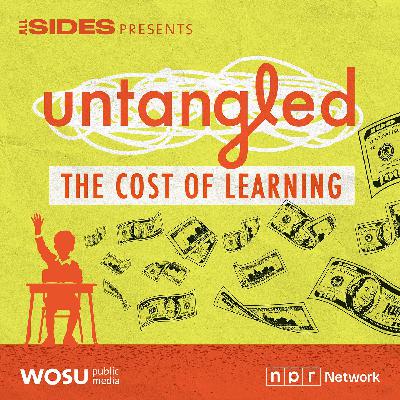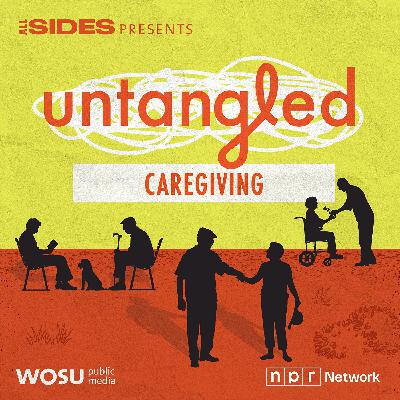Discover Untangled
Untangled

Untangled
Author: WOSU Public Media
Subscribed: 7Played: 59Subscribe
Share
© Copyright 2024 WOSU Public Media
Description
Untangled, a podcast from All Sides, takes a complicated topic and untangles it for you. On this season, we will unpack how we pay for schools, where the money goes, if it’s spent wisely, and try to answer the question: is there a better way?Subscribe to Untangled wherever you get your podcasts or listen live Monday mornings at 11 a.m. on 89.7 NPR news.
35 Episodes
Reverse
At times when school levies and property tax relief are hot-button political issues, a persistent myth about Ohio Lottery profits and education tends to resurface. One listener asked WOSU’s "Curious Cbus," “Wasn’t the state lottery supposed to replace property taxes as a method of school financing?”
Lawmakers on both sides of the aisle are trying to reform property taxes, but is there a way to do that without leaving public K-12 schools in financial distress? We will hear from two Ohio lawmakers: Republican State Sen. Louis Blessing and Democratic State Rep. Bride Rose Sweeney.
We’ll hear from the superintendents of Columbus City Schools, Hilliard City Schools and Fairfield-Union Local Schools for an urban, suburban and rural perspective.
We talk to three different Ohio school districts that are asking voters to support their local schools in three different ways.
The use of taxes, including property taxes, to pay for that education dates by to the America's original 13 colonies. We talk about the history of education funding in the United States and Ohio and where it is heading in the near future.
In Ohio, there has been a growing debate over fairness when it comes to education. But what about outside of Ohio. How do other countries pay for a child’s education? And how do other states pay for their K-12 public schools?
How much does it cost to educate Ohio’s school kids? We will break down where the money comes from and how much is currently being spent.
At the foundation of every school building is a battle: a battle over taxes, spending and fairness. Education is a fundamental right. The responsibility is clear, but who pays? That answer is not so clear.
From Medicare to Medicaid to social security, health care has long been a hot-button political issue. What can be done by policymakers to create a better elder care system?
In this bonus episode, we learn about an innovative program from the Franklin County Office of Aging that adds lively competition and personal connection to the gaming experience.
Caring for elderly family members can take both a physical and mental toll. But who takes care of the caregivers?
Are there enough nursing homes, assisted living facilities and home health aides to help everyone regardless of income and location?
One of the biggest concerns when it comes to taking care of the elderly is the cost of home health care, assisted living and legalities attached to them.
Navigating the complex system of American healthcare insurance can be frustrating, to say the least.
Join us for a new season of Untangled where we will unpack our eldercare system and explore if we, as a society, are prepared to support our future aging population.
We’re breaking down what is and is not in Issue 1, so you can make an informed choice this November when you head to the polls. Guests include Ohio Sen. Rob McColley and Jen Miller, Executive Director of League of Women Voters.
In Arizona and Michigan, independent commissions draw the maps, but the process hasn’t been without its bumps. In Iowa, an advisory commission drafts congressional and state boundaries but the state legislature retains final authority to implement them. Guests include: Colleen Coyle Mathis, former chair, Arizona Independent Restricting Commission; Dave Wells, research director, Grand Canyon Institute, retired professor, Arizona State University; Lauren Gibbons, state government reporter, Bridge Michigan; and O. Kay Henderson, news director, Radio Iowa.
When it comes to redistricting everyone says they want fair maps. That’s the easy part. The hard part is setting a legal standard for drawing them. We’re untangling how to draw fair maps this episode. Guests include: Dave Wasserman, Senior Editor & Elections Analyst for The Cook Political Report; Samuel Wang, Princeton Gerrymandering Project Professor; Dan Vicuna, director of redistricting and representation for Common Cause.
Gerrymandering is bad, right? Drawing congressional or statehouse districts to benefit one party at the expense of the other is wrong. Right? As we untangle redistricting this season, we wanted to unravel the belief that gerrymandering is bad. Guests include: Matt Huffman, Ohio Senate President (R-Lima); Maureen O’Connor, former chief justice of the Ohio Supreme Court; Allison Russo, Ohio House Minority Leader (D-Upper Arlington); David Pepper, former Ohio Democratic Party Chair; Jeff Berding, co-owner of FC Cincinnati; and David Niven, political science professor at the University of Cincinnati.
Ohioans are going to the polls this November to vote on redistricting, again. It’s the fifth time in 20 years that we’ve been asked whether we want to change how we draw the boundaries for our statehouse and congressional districts. Guests include Matt Huffman, Ohio Senate President (R-Lima); Maureen O’Connor, former chief justice of the Ohio Supreme Court; Tom Hunter, professor of political science at the University of West Georgia; Jo Ingles, reporter with the Ohio Public Radio Statehouse News Bureau; Allison Russo, Ohio House Minority Leader (D-Upper Arlington); David Pepper, former Ohio Democratic Party Chair; and Frank Strigari, Republican Senate Counsel.







